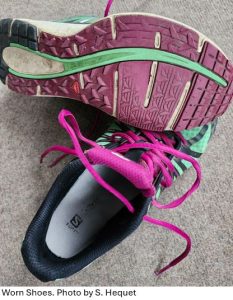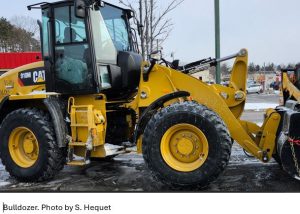End of Summer
Suzanne Hequet

Running. Running with the wind. Sun is so bright its rays glare on the roadbed. Running. God, this feels good. The rhythm is just right. Good cadence. Dirty snow of late winter in the ditches is almost gone. Sun is almost warm.
Five-mile mark—glad I marked it with a big stick! Time to turn back and face the wind.
Running. Need to get new shoes. These don’t even last for a ten-mile jaunt! New job will pay enough—maybe. New shoes and first semester books? Could be tight. I hate the city. But I need a four-year degree. Need it.
Running. Running against the wind now. Slower pace, but the wind still feels good on my face. Sun feels good on my back. Almost home. I’ll need a quick shower and then into work clothes.
What a job! I get to “play” with a three-ton payloader, wear worn jeans and my Metallica T-shirt. Steel toed boots—just in case. Pushing piles of corn. Someone will tell me where, how high…all the important stuff. I just push levers and bounce around in the cab until mid-August. Then everything changes. Except the running.
Running. Time to ease off the pace. Last uphill stretch into the wind. God, everything is stretched to aching. Still, this is perfection!
I drive to the canning plant located in Welcome. Odd name for a town that is so unfriendly. Still, they hired me, so the people there can’t be too bad. There’s the elevator and concrete flats—about three football fields of concrete paving just waiting for beans and corn to arrive. There’s my boss. I park off to the side on the gravel lot. As I get out of my 1988 Oldsmobile Cutlass, he motions me to follow him. He walks toward a CAT payloader. That’s what I’ll be driving. It’s a lot bigger than the Bobcat skid loader I’m used to. But the basics are there. I climb in and start it up. Feels good. Big and sturdy. The boss climbs up and points to a few buttons. He says something, but the motor’s too loud. Can’t hear a thing he’s saying. Then he points to the headphones hanging from the visor. I put them on. Wow! These are way cool. I can hear the tower giving directions. It’s like bulldozer by number! The boss holds up seven fingers. I hear the tower say, “Dozer seven. Next load is yours. Push to conveyor C-3. Glad to have you on board. Don’t fuck up.”
Semi-trucks are backed up, waiting to dump their loads. There’s my first load. The boss is still hanging on the dozer’s running board, pointing the way. I thought I’d be pushing corn, but of course, it’s too early for that. Corn must be later this summer—July and early August. But now it’s mostly beans. I line up the bucket plow and begin to push. The boss points the way as I push toward the conveyor belt in the gap ahead. I get the okay sign to move the load, and after three shoves, my first load is done. I get an okay signal and a “continue” sign as the boss jumps down and moves toward the tower. Then I hear another call from the tower. “Number seven. Push the next truck’s load to conveyor C-3 again.”
The morning progresses. I get instructions, I move stuff to conveyors. Then repeat. I love this job. Good pay. Almost no thinking…Almost.

After three hours, the lunch whistle blows. Oops. Forgot to bring a lunch. I hit the machines in the tin workers’ shed. The milk is cold. That’s enough. I don’t feel much like talking, but I don’t want to be antisocial. So after a few minutes, I join the three other drivers and the boss. Small talk is mostly about stuff I don’t understand or care about. So much to look forward to that I find myself dreaming about college and new running shoes.
I look back at the lot as more trucks begin to come in and line up. I like the look of my number seven dozer. Strong, with just the right amount of dirt to show it’s a working machine.
Is it moving? Some trick of my eyes? My brain? It is moving. Rolling. Slowly. My boss has noticed.
“Shit! Schultz—what the hell?”
Now I see it too. “I did what you told me.”
“Did you set the second brake?” Second brake? I never even thought about a second brake on the Bobcat skid loader I used to drive. But on a CAT payloader?
“I didn’t know it had one.”
Now we’re running. Not noticing wind or sun. Just running flat out. Why? I have no idea. Can’t stop a three-ton payloader once its rolling. And it is rolling. Toward the debris ditch.
The CAT dropped into the ditch, stuck nose-down. What a mess.
That ended work for the day. And probably for the rest of my life. How much does a payloader cost? Or, how much does it cost to tow one out of a ditch full of crop debris. If I can’t afford new shoes, how can I pay for this?
I was done for the day. Done forever. Fired. The boss just kept shaking his head, looking at the CAT in the ditch. I drove home on back roads. County 16. Kept watching for someone coming up behind, afraid they’d send the police to confiscate my car or arrest me. But no one came.
Once home, I checked my phone. There was a message. Call the Welcome Grain Elevator. I was scared but called anyway. My boss patched me through to the elevator supervisor.
“Thought you’d want to know that we got the dozer out of the ditch. I know the platform boss fired you. That means no more work with our heavy equipment. But after talking it over with management, we want to invite you back. Specifically, to work in the office. Spreadsheets and other computer stuff. Your hourly rate will be lower, but you’ll have more hours. 7 a.m. to 5, Monday through Friday. You’ll still make pretty good money. So—what’d you say? You want this job in the office?”
I felt myself nodding my head. Then caught myself—I hadn’t answered him out loud into the phone! Realizing that my delay might sound like I was thinking, which I wasn’t—at least not very clearly, I replied, “Yes, thank you for calling. I’ll be there at 7 a.m. sharp.”
“One more thing. You’ll need appropriate office clothes. No t-shirts, no jeans. And no sneaks. That still okay?”
“Oh. Yeah. I’ll get to Penny’s right now and buy some clothes. Thank you again, sir. Thanks.” And I hung up.
I carefully replaced the phone in the cradle. And started to shake all over. After I threw up, I checked my wallet. Not much there, but enough for one shirt and a pair of pants. The shoes would have to wait, but I think my old loafers might work.
I bought the cheapest office attire I could find at Penny’s. Then I went to bed. Slept poorly until the alarm went off at 5 a.m. the next morning. Time to shower and pretend I was brave. No time to run. Shoes were shot anyway.
After a long shower, I was ready to face whatever came next.
I worked that summer in the office. Mostly data entry. No wind, only a little sun. The hours were long, leaving no time to run. Funny. Even though I hardly exerted myself in the office, I was always exhausted at day’s end. No time to run. No desire to run. No shoes good enough to run in. And no time or money to buy new shoes.
As August began, they offered me an extended contract. I declined. I needed to go to school. And I did. Found my dorm room. Unpacked. No roommate in sight. I knew I needed a run. A long run. But my shoes were shot. And where could I run in the city? Ten miles to nowhere. No shoes. No run. Summer was over—maybe over forever.

